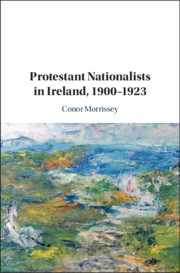Book contents
- Protestant Nationalists in Ireland, 1900–1923
- Protestant Nationalists in Ireland, 1900–1923
- Copyright page
- Dedication
- Contents
- Tables
- Acknowledgements
- Irish-Language Terms Used
- Abbreviations
- Introduction
- 1 Radicals, c. 1900–1910
- 2 Dissidents, 1900–1910
- 3 Converts, c. 1910–1916
- 4 Militants, 1912–1916
- 5 Rebels, 1916–1917
- 6 Outsiders?, 1918–1921
- 7 Revolutionaries, 1919–1923
- 8 Free Staters, 1922–1923
- Conclusion
- Bibliography
- Index
3 - Converts, c. 1910–1916
Published online by Cambridge University Press: 11 October 2019
- Protestant Nationalists in Ireland, 1900–1923
- Protestant Nationalists in Ireland, 1900–1923
- Copyright page
- Dedication
- Contents
- Tables
- Acknowledgements
- Irish-Language Terms Used
- Abbreviations
- Introduction
- 1 Radicals, c. 1900–1910
- 2 Dissidents, 1900–1910
- 3 Converts, c. 1910–1916
- 4 Militants, 1912–1916
- 5 Rebels, 1916–1917
- 6 Outsiders?, 1918–1921
- 7 Revolutionaries, 1919–1923
- 8 Free Staters, 1922–1923
- Conclusion
- Bibliography
- Index
Summary
This chapter largely focusses on the behaviour of Protestants from unionist backgrounds who adopted nationalist politics. The first section assesses the ideology of pre-1916 Sinn Féin, whose efforts to encourage Protestant participation led certain intellectuals to believe it posed a threat to unionist hegemony, but whose failure to develop a secular programme ultimately impeded its efforts. The next section discusses ‘synthetic Gaels’, those Protestant converts to nationalism whose extravagant attempts to fit in could raise smiles or prompt hostility. In the next section, Protestant advanced nationalist women are assessed as a group, by means of a denominational, socioeconomic, and geographical examination. Their writings are used to assess their motivation for converting to an advanced nationalist position. The final section deals with conversion to Catholicism, and argues that religious conversion was rare, being mostly confined to advanced nationalist women.
- Type
- Chapter
- Information
- Protestant Nationalists in Ireland, 1900–1923 , pp. 78 - 106Publisher: Cambridge University PressPrint publication year: 2019

